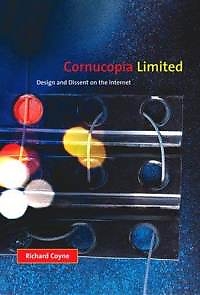The network economy presents itself in the transactions of electronic commerce, finance, business, and communications. The network economy is also a social condition of discontinuity, indefinite limits, and in-between spaces. Coyne argues that design, with its open-ended and transgressive explorations, provides a new way to think about the world of commerce; design’s inter-territorial precinct, its in-between condition, offers a way to frame the problems of the Internet economy—for profit vs. for free, private vs. public, security vs. open access, defense vs. permeability.
Design, says Coyne, has a natural affinity with the edge condition and the position between polar opposites. Edgy design starts with an idea, brings to mind its opposite, and then works with what emerges from the friction between the two. The designer of a Web portal, for example, might take on the problem of security by focusing on the limits of permeability. Design is edgy, and risky, argues Coyne, in the same way that breaches in network security are risky. In Cornucopia Limited he examines the threshold between conditions exemplified by the boundary between design and commerce. Coyne uses five metaphors of design to develop his argument: the household (in economics, historically opposed to the market), with its relationship to the street mediated by various portals; the machine, rampant and glitchy; the game, competitive but simulated; the gift, precursor to commerce; and the threshold. The threshold condition, Coyne says, is the site of edgy design and a portal into the new. The threshold, he argues, provides the most potent metaphor for understanding the liminal dwellers of the network economy.
